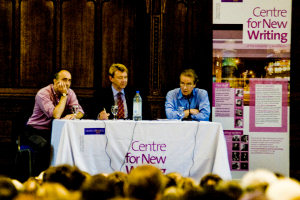Amis rejects heaven at latest literary debate.
04 Jul 2008

Professor of Creative Writing Martin Amis took part in his final public event of the academic year on 1 July: a debate on literature and religion.
Organised by the Centre for New Writing, the event took place in a packed Whitworth Hall and was hosted by the head of Arts, Histories and Cultures Professor Graham Ward. Himself an esteemed theologian, the panel also featured renowned literary critic and Harvard professor James Wood.
Having reviewed the historical relationship between literature and religion, and recent shifts into secularism and post-secularism, Professor Ward invited both panellists to summarise their positions on the subject. Given recent media coverage, Martin Amis’s apparent tolerance of religious viewpoints was perhaps surprising; but he explained his belief that atheism is a "deeply irrational and presumptuous position" with reference to the 98% of the universe’s material which we know nothing about.
But, although religion may be seen as solving the problem of death, for Amis it does not do so satisfactorily, and it further fails to resolve the problems of panic and evil in the world. In his view, literature is more worthy of worship; by virtue of its beauty and the fact that it is tangibly here.
Having grown up in an evangelical Pentecostal household, the teenage James Wood discovered literature as a refuge from religion - an escape hatch into an alternative world. Although both require belief in their subject matter to succeed however, he sees fiction as unable to command this as religion does - the fact that it is fiction being inescapable.
Yet the two are inextricably linked in his view. The Bible itself begins with "a profoundly unconvincing" explanation of the origins of evil; a subject which has provided the central theme of literary narrative across the ages.
Following these summaries the discussion was opened up to the audience of students, academics and members of the public, including church - and secular leaders from across Greater Manchester. Questioners quizzed the panel on subjects including the perceived turn against secularism in recent literature, the emergence of more individualistic forms of religious practice and the possible existence of a utopia or heaven.
To Professor Amis, this latter idea was "repellent" in its clichés of universal happiness and brotherly love. His own priorities clear, he demanded: "Where would the art be?!"
